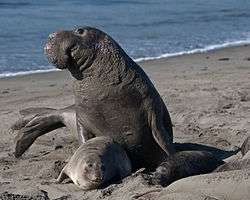November 5, 2014 report
Adding fat found to offer sea mammal foraging benefits

(Phys.org) —A team of researchers with members from Japan and the U.S. has found that at least for one marine mammal, adding blubber provides a foraging advantage. As the team writes in their paper published in Proceedings of the Royal Society B: Biological Sciences, it appears that female northern elephant seals gain an advantage in foraging from extra blubber because of the extra buoyancy it provides.
There are two species of elephant seal (also known as sea elephants)—northern and southern, living respectively in the northern or southern hemispheres. The northern species is much smaller than its southern cousin, though still quite large—males can weigh up to 5400 pounds. They spend approximately 80 percent of their lives in the sea where they are quite nimble. On shore, it's a far different story as they appear barely able to move due to the large amounts of blubber on their bodies—the fat helps them keep warm in extremely cold water. In this new effort, the researchers wondered if all that added fat tended to hinder their ability to catch prey.
To find out, the researchers affixed monitors to 14 females which allowed for monitoring their activities (including the ability to count flipper strokes during ascent and descent) as they migrated south across 4000 miles of water away from their breeding grounds in California. Females were chosen because of the great weight changes they go through. During the breeding season, they don't eat at all, losing a lot of their blubber. Once migration begins, they begin to pack on the blubber again as they hunt and eat a lot while travelling. This allowed the researchers an excellent opportunity to test whether the sea mammals were better or worse at catching prey while thinner, versus fatter. In land animals, extra fat tends to have an energetic cost and slows movement; up till now, little has been known about the impact on marine mammals.
In analyzing the data, the researchers found that the added buoyancy the blubber provided allowed the females to stay underwater for longer periods of time (fewer flipper strokes were needed) which in turn allowed them more hunting time. Thus, packing on the pounds, at least for elephant seals, offered a clear benefit. They noted also that there appeared to be a sweet spot—too little blubber and the seal had to work harder to surface, too much and it had to fight to descend.
More information: The foraging benefits of being fat in a highly migratory marine mammal, Proceedings of the Royal Society B, Published 5 November 2014 DOI: 10.1098/rspb.2014.2120
Abstract
Foraging theory predicts that breath-hold divers adjust the time spent foraging at depth relative to the energetic cost of swimming, which varies with buoyancy (body density). However, the buoyancy of diving animals varies as a function of their body condition, and the effects of these changes on swimming costs and foraging behaviour have been poorly examined. A novel animal-borne accelerometer was developed that recorded the number of flipper strokes, which allowed us to monitor the number of strokes per metre swam (hereafter, referred to as strokes-per-metre) by female northern elephant seals over their months-long, oceanic foraging migrations. As negatively buoyant seals increased their fat stores and buoyancy, the strokes-per-metre increased slightly in the buoyancy-aided direction (descending), but decreased significantly in the buoyancy-hindered direction (ascending), with associated changes in swim speed and gliding duration. Overall, the round-trip strokes-per-metre decreased and reached a minimum value when seals achieved neutral buoyancy. Consistent with foraging theory, seals stayed longer at foraging depths when their round-trip strokes-per-metre was less. Therefore, neutrally buoyant divers gained an energetic advantage via reduced swimming costs, which resulted in an increase in time spent foraging at depth, suggesting a foraging benefit of being fat.
Journal information: Proceedings of the Royal Society B
© 2014 Phys.org


















